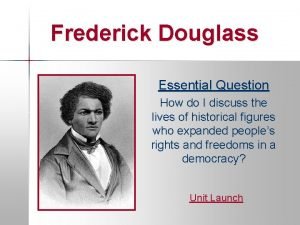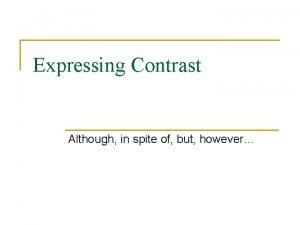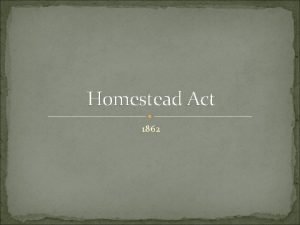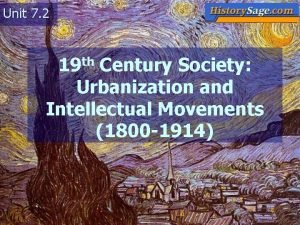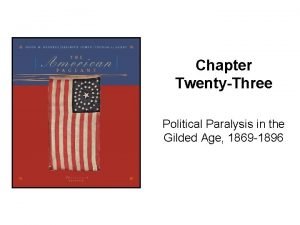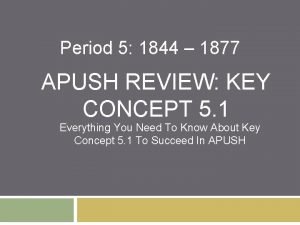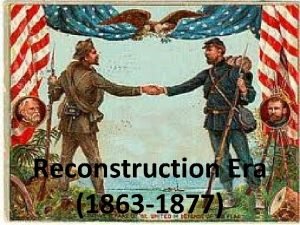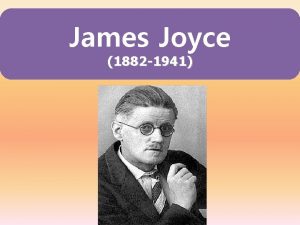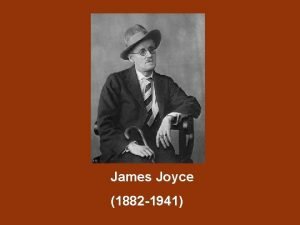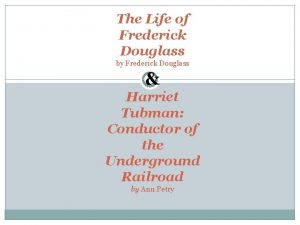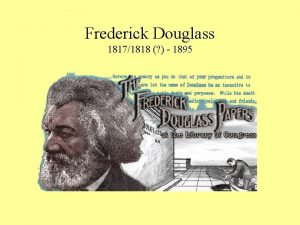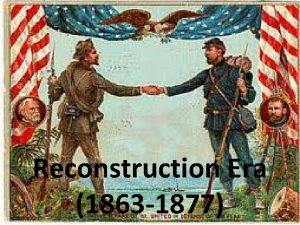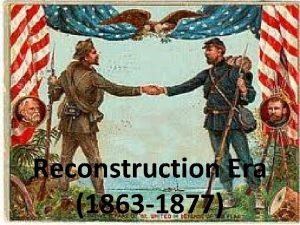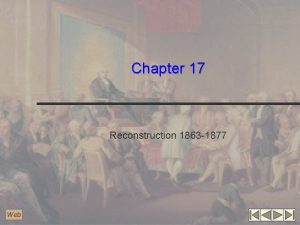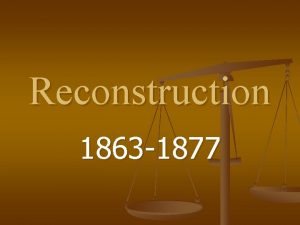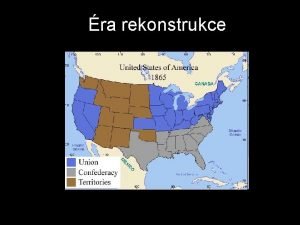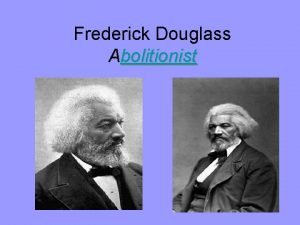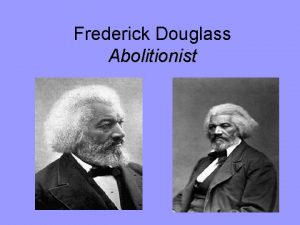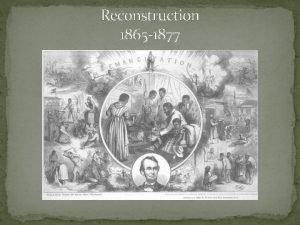RECONSTRUCTION 1863 1877 Frederick Douglass 1882 Though slavery















































- Slides: 47

RECONSTRUCTION 1863 -1877

Frederick Douglass, 1882 “Though slavery was abolished, the wrongs of my people were not ended. Though they were not slaves, they were not yet quite free. No man can be truly free whose liberty is dependent upon the thought, feeling, and action of others, and who has no means in his own hands for guarding, protecting, defending, and maintaining his liberty. ”

OVERVIEW � Questions to consider � How would the South rebuild society and economy? � What would be the place in society for 4 million freedmen? � To what extent, if any, was the federal government responsible for helping ex-slaves adjust to freedom? � Should former Confederate states be treated as though they never really left the Union (Lincoln) or as conquered territory subject to military occupation? � What will the conditions be for restoring the Confederate states to the Union? � Under whose authority will these questions be decided: the president or Congress?

� Conflicts before war unresolved after � Sectional issues � Political parties � Economic interests � N. Repubs � Desire � Southern planter class � Cheap � to continue econ. progress of war labor force Freedmen � Independence, equal rights

� Reconstruction issues � Limited c. gov. vs. states’ rights little bold action � Little econ. help for whites & blacks in S Free people in free society have opportunity/responsibility to help selves � Physical rebuilding of south left to states, individuals Fed. Gov. dealt w/ political issues

Plans for Reconstruction � Abe- Constitution not allow for states to leave Union � CSA in rebellion- did not actually leave Union � = disloyal minority

Lincoln’s Polcies � Reestablish Union w/ minimum test of political loyalty � Very � lenient Proclamation of Amnesty & Reconstruction � Dec. 1863 - to reconstruct state govs. w/ Unionists Presidential pardon for most Confeds �Oath of allegiance �Acceptance of emancipation State gov. reestablished � 10% voters take oath

� � State’s rewrite constitution- accept emancipation, eliminate slavery Lenient policy to shorten war, given weight to EP � Late ‘ 63 - if Dems won ‘ 64 election, EP overturned

Wade-Davis Bill � � 1864 Repubs object to Lincoln plan � 10% plan “supposedly reconstructed” state gov Fall to disloyal secessionists � W-D Bill = more stringent than 10% plan � 50% loyalty oath � Only non-Confeds vote for new state constitution � Lincoln veto

Freedmen’s Bureau � � March, ‘ 65 - Bureau of Refugees, Freedmen, and Abandoned Lands = early welfare agency � Food, shelter, medical aid for blacks, homeless whites � Initial authority to resettle freedmen on confiscated land � BUT � land restored (courts) Education � Gen. Oliver O. Howard (3 k schools, 200 k literate)

Lincoln’s Death � April 11, 1865 � Speech to accept LA new state constitution � Voting rights to “very intelligent” and those who “serve our cause as soldiers” � Assassination on April 14, 1865 � Died � on 15 th Enter Johnson

13 th Amendment � 13 th Amendment to U. S. Constitution passed on Dec. 6, 1865 �= 1 st Reconstruction Amendment abolishes slavery Section 1. Neither slavery nor involuntary servitude, except as a punishment for crime whereof the party shall have been duly convicted, shall exist within the United States, or any place subject to their jurisdiction. Section 2. Congress shall have power to enforce this article by appropriate legislation

Johnson & Reconstruction � Tennessean � S. Dem. � Champion rights of poor whites vs. planter elite White supremacist � Confederate � senator- remain loyal to Union troops into TN Johnson as state war gov. until ‘ 64 = VP � Lure pro-Union Dems to vote Republican

Johnson’s Plan � � Johnson hate planter elite Republican support May, ‘ 65 � Reconstruction proclamation similar to Lincoln 10% � Lincoln’s terms + disenfranchisement of former Confed leaders/officeholders & Confeds w/ $20 k in taxable property No voting rights No ability to hold office �President still retain pardon �= “escape clause”

Southern Governments � By end of ‘ 65, all ex-Confed states qualify for readmission � Repudiate secession � Ratify 13 th Amend. � Issue? � None grant voting rights � Some former Confederates back in Congress Alexander Stephens (VP of CSA) = Senator from GA � Rift b/t Johnson, Repubs

Black Codes � S. legislatures pass Black Codes = restriction � Freedmen can’t rent land, borrow money to buy land � Freedmen must sign work contracts as “vagrants” or “apprentices” Form of semibondage Contract-labor system �Work under white supervision, deferred wages � Freedmen can’t testify against whites

Veto Power � � Deeper rift b/t Johnson, Congress by ’ 66 Vetoes: � Bill to increase services/protection by FB � Civil rights bill to nullify Black Codes � Full citizenship, equal rights to African-Americans � = end of “first round” of Reconstruction � Recap? Lincoln, Johnson restore all 11 states Ex-Confeds back into high offices Black Codes established

Round 2: Congressional Reconstruction Spring 1866 in response to Johnson’s veto policies Dominated by Congress

Radical Republicans � � Repub. Party: Radicals vs. Moderates 1866 - more turn radical- fear that united Dem party resurgence of political dominance � No more 3/5 rule for population count � South gain reps, more strength in EC � Led by Sumner & Thaddeus Stevens � TS- military reconstruction Civil rights for freedmen, education through schools operated by fed gov, lands granted (from planter class) Benjamin Wade- also extend- suffrage to women, labor union rights, civil rights for freedmen

Civil Rights Act of 1866 � 1 st action of congressional Reconstruction � Counteract � Johnson’s veto of previous Freedman’s Bureau � food, clothing, hospitals, education, legal protection former slaves and poor whites � � Citizenship to African Americans Forbid states from passing discriminatory laws (black codes) that restricted African-American lives � Johnson vetoed Act, but was overridden by Congress

14 th Amendment � � June, 1866: ratified 1868 Prevented states from denying rights and privileges to any U. S. citizen � All born, naturalized = citizens � “equal protection of the laws” � “due process of law” Purpose was to overrule the Dred Scott decision First time- states & fed gov. must uphold rights of citizen �Later: used for civil rights cases- minorities, women, children, disabled

Joint Committee Report � June, 1866 - report says former states NOT entitled to representation � Any Senators, Reps should NOT be able to take seats � � Recommend Congress, not Pres. , had authority to set conditions for states to rejoin Union Report = rejection of Pres. Plan(s)

Elections of 1866 � Johnson campaign- attempt to bring in Dems so can work w/ Congress � “swing around the circle”- attack opponents � Equal rights “Africanized” society � Counter by Republicans = “waving the bloody shirt” � Vote the way you shot � Don’t forget hardships of war caused by Southern secession anger of N. voters � Propoganda: Southererns=Dems, so Dems=party of rebellion, treason � Results? Repub victories (more than 2/3 maj. In both Houses

Reconstruction Acts of 1867 � � Acts pass over Johnson vetoes South placed under military occupation � 5 � military districts, Union army in control Increase requirement to gain readmission � Ratify 14 th, guarantees in constitution for voting rights

Reconstruction Act & Impeachment � 1868: Pres. Johnson removed Edwin Stanton as Sec. of War. � Charge Pres. with violation of Tenure of Office Act (‘ 67) � House voted to impeach Johnson (11 high crimes, misdemeanors) � 1868 - one vote short for removal (2/3) Some RR not want to set precedent of removing pres. For political reasons/gains 1998 - Clinton impeached

Enter Grant � Ulysses S. Grant wins presidency in 1868 � Repub- Grant, war hero (no politics) � 500 k freedmen vote � 1869 - 15 th Amendment: No one could be kept from voting based on race, color, previous condition of servitude. � Ratified in 1870.

Civil Rights Act of 1875 � � Reform after Grant = last reform by Congress in Reconstruction Guarantee of = accommodation in public places � Hotels, � � RR, theaters Courts could not exclude African Americans from juries POOR ENFORCEMENT � Moderate, conservative Repubs frustrated w/ attempts to reform unwilling South � Fear of losing white votes in north

Reconstructing Society � After war, Northerners begin to infiltrate South: � South in ruins = economic opportunity � Northerners take advantage of financial/political opportunity Investment into rebuilding projects Republican government officials

� Scalawags= white southerners who joined the Republican party � To improve life/economic conditions � To stop wealthy planters from regaining power � Did not share Republican commitment to civil rights for blacks � Carpetbaggers= Northerners who moved south to take advantage of economic opportunities � Some to work in schools to education freedmen

A New Life for Former Slaves � Many slaves illiterate, so educating freedmen becomes important � Public schools open in southern states as part of Reconstruction governments � Churches serve as education centers � Reconstruction brings in 16 African-Americans into Congress � 1870 - Hiram Revels is first black Senator from Mississippi Took J. Davis seat

� Sharecropping: � Freedmen and poor white farmers - no way to make money or feed families. � Landowners divide land into small tracts � Supply seed, tools- family farm land. � Family keep share, rest goes to owner. (50/50) � Tenant Farming: � Man/Family able to rent a piece of land. Keep entire harvest.

Success or Failure � � Abuse of power for selfish ends (plunder, corruption) OR govern responsibly in name of public interest? BOTH Success� State constitutions w/ universal male suffrage, property rights for women, debt relief � Promote infrastructure � State institutions- hospitals, asylums � Public schools

� Failure � Republican rule seen as wasteful, corrupt Graft, wasteful spending, kickbacks, bribes � General decline in ethics

Adjusting to Freedom

Black Communities � Freedom = reuniting families, education, move into cities � Schools: Howard, Fisk, Morehouse Teachers, ministers � Biggest? Freedom from white control Exodusters Communities in frontier areas Ex. of push for autonomy = growth in black churches �Independent of white churches �Negro Baptist, AME �Black ministers = community leaders

The North During Reconstruction Economy driven by industry, pro-business policies of Republicans -Focus on RR, steel, labor issues, money - Material interests push aside idealism of Lincoln’s generation

Spoilsmen � 1870 s- Republican leadership from Sumner, Stevens to political machines (Conkling, Blaine) � Senators- � NY & ME Patronage reemerge corruption in business & government

Corruption � � Motto? Enrich self @ public’s expense Grand Admin. Scandals � 1869 - Black Friday Fisk, Gould, and Gold � Credit Mobilier � Whiskey Ring � Indian Ring � � No personal profit for Grant, but loyal to dishonest men around him Local/State Scandals � Tweed Ring

Election of 1872 � � Grant scandals break in Republican party Reformers = Liberal Republicans � Horace Civil Service Reform End to RR subsidies Withdrawal of troops from S Reduced tariffs Free trade � Dems � Greeley = Pres. Candidate also nominate Greeley (without permission) “Waving the bloody shirt” tactics by Republicans = Grant BACK!

Panic of 1873 � Grant 2 nd term start w/ econ. disaster � Northern � Causes? Overspeculation, overbuilding � � workers jobless, homeless business failures, depression Relief? Debtors demand greenbacks � Republicans = tight money policies � Hard-money bankers, creditors only want gold standard � 1874 - Grant veto bill calling for release of additional greenbacks

End of Reconstruction � � � 1873 = Third phase Radical Repubs weak in Congress Southern Conservatives = “Redeemers” take control of south by 1877 � Violence, intimidation against Republicans, blacks � Promote: states’ rights, reduced taxes, reduced government spending (social welfare), white supremacy

Ku Klux Klan � Vigilante groups � some unable/unwilling to accept change Reconstruction and with Civil Rights � Used � violence to intimidate blacks Ku Klux Klan: Confederate terrorist organization � 1865, Pulaski, TN- N. B. Forrest � = social club former Confederates � violent vigilante group � Create “invisible empire” Burn black buildings, violence to prevent voting

� Goal =destroy Republican party, overthrow Reconstruction governments, prevent blacks from voting � violence to threaten, intimidate � All classes join To preserve law & order in white-dominated society � Violence against white Republican leaders Southern states fight back against KKK (TN, TX, NC, SC), . �Little success- local judges, policemen, mayors were Klansmen � KKK gain local power over state or federal authorities

Congressional Acts of 1870, 1871, 1872 � Force Acts � 1870/1871 - Provided that there be federal supervision of elections � Use of federal troops in area where Klan was active � Amnesty Act: 1872 � Returned rights to over 150, 000 former confederates � Right to vote, right to hold federal/state offices � 1872 - Freedmen’s Bureau expired � Both allow Southern Democrats to regain power

Election of 1876 � 1876 - federal troops withdrawn from all but SC, FL, LA � Dems � Repub. Convention nominate Rutherford B. Hayes (Gov. , OH) � Need � back in power in all but SC, FL, LA someone untouched by Grant scandals Dem. Convention nominate Samuel J. Tilden � Famous for taking down Tweed Ring

� EC issue � Tilden took popular votes- assume would win EC � Problem- SC, FL, LA = contested EC returns � Tilden only need one more EC vote from the three to win � Electoral commission determine votes � 8 -7 in favor of Hayes (straight-party vote) � Dems outraged, threaten filibuster to send to House (Dems controlled)

Compromise of 1877 � � Informal deal to solve issue Dems allow Hayes to take EC votes IF � End federal support for Repubs in South = removal of remainder of troops � Build � a Southern transcontinental RR End of military presence + Supreme Court decisions = end of Reconstruction � Reconstruction laws struck down
 Map of frederick douglass escape route
Map of frederick douglass escape route House slave
House slave Learning to read and write frederick douglass analysis
Learning to read and write frederick douglass analysis Talbot county maryland frederick douglass
Talbot county maryland frederick douglass Frederick douglass and harriet jacobs
Frederick douglass and harriet jacobs Frederick douglass comprehension questions
Frederick douglass comprehension questions Frederick douglass brainpop
Frederick douglass brainpop When to use however in a sentence
When to use however in a sentence Palmer hayden
Palmer hayden Edouard manet olympia 1863
Edouard manet olympia 1863 Olympia, 1863
Olympia, 1863 The three uses of money
The three uses of money Manet, olympia, 1863
Manet, olympia, 1863 Constitucion de 1863
Constitucion de 1863 Soddies definition
Soddies definition What country did impressionism originated from
What country did impressionism originated from Edouard manet olympia 1863
Edouard manet olympia 1863 Hjälper sedan 1863
Hjälper sedan 1863 July 1-4 1863
July 1-4 1863 Edouard manet olympia 1863
Edouard manet olympia 1863 Edouard manet olympia 1863
Edouard manet olympia 1863 Nov 19 1863
Nov 19 1863 The second industrial revolution timeline
The second industrial revolution timeline 1877-1865
1877-1865 Tanssija 1877-1927
Tanssija 1877-1927 The key tradeoff featured in the compromise of 1877
The key tradeoff featured in the compromise of 1877 Anthony comstock apush
Anthony comstock apush Whats the compromise of 1877
Whats the compromise of 1877 Reconstruction era art
Reconstruction era art Compromise of 1877
Compromise of 1877 The gilded age 1877 to 1898 worksheet answers
The gilded age 1877 to 1898 worksheet answers 1877 to 1918 cloze notes
1877 to 1918 cloze notes The great railroad strike of 1877 was provoked by:
The great railroad strike of 1877 was provoked by: 1877 golden 1
1877 golden 1 1894 railroad strike
1894 railroad strike Haymarket square riot apush
Haymarket square riot apush Https//a-z-animals.com
Https//a-z-animals.com Genre of a separate peace
Genre of a separate peace Anna murray-douglass
Anna murray-douglass Hamish and alexandra douglass
Hamish and alexandra douglass Katie douglass
Katie douglass Courtney douglass
Courtney douglass Reg és arany jános
Reg és arany jános 1941-1882
1941-1882 1941-1882
1941-1882 1941-1882
1941-1882 1941-1882
1941-1882 1941-1882
1941-1882






